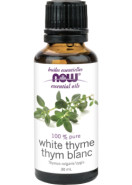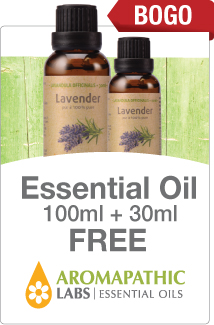Thyme
Why Select Thyme Supplements?
Thyme is a fragrant herb that has been a staple in kitchens and apothecaries for centuries. Indeed, originating from the Mediterranean region, thyme (Thymus vulgaris) not only enhanced the flavours of countless dishes, cocktails and mocktails but has long been a valuable remedy in traditional medicine thanks to its remarkable therapeutic effect and health benefits. Read more >-
 100% PURE WHITE THYME OIL FROM NOW FOODS 100% PURE ESSENTIAL OIL WHITE THYME STEAM DISTILLED FROM SPANISH THYME LEAVES. The spicy-herbaceous aroma of thyme was commonly used by the ancient Greeks as incense and perfume. More recently thyme oil has been used for its antiseptic properties and has known to be helpful for fatigue and exha...100% PURE WHITE THYME OIL FROM NOW FOODS 100% PURE ESSENTIAL OIL WHITE THYME STEAM DISTILLED FROM SPANISH THYME LEAVES. The spicy-herbaceous aroma of thyme was commonly used by the ancient Greeks as incense and perfume. More recently thyme oil has been used for its antiseptic properties and has known to be helpful for fatigue and exhaustion. The sharp scent of thyme is often found in vapor rubs, mouth washes, cough drops and more. Ideal for use in a diffuser or mixed with massage oil, thyme oil may also be delicious in some of your favorite recipes. Mixes nicely with Bergamot, geranium and others. [LIQUID]+ Earn 19 Reward Points
100% PURE WHITE THYME OIL FROM NOW FOODS 100% PURE ESSENTIAL OIL WHITE THYME STEAM DISTILLED FROM SPANISH THYME LEAVES. The spicy-herbaceous aroma of thyme was commonly used by the ancient Greeks as incense and perfume. More recently thyme oil has been used for its antiseptic properties and has known to be helpful for fatigue and exha...100% PURE WHITE THYME OIL FROM NOW FOODS 100% PURE ESSENTIAL OIL WHITE THYME STEAM DISTILLED FROM SPANISH THYME LEAVES. The spicy-herbaceous aroma of thyme was commonly used by the ancient Greeks as incense and perfume. More recently thyme oil has been used for its antiseptic properties and has known to be helpful for fatigue and exhaustion. The sharp scent of thyme is often found in vapor rubs, mouth washes, cough drops and more. Ideal for use in a diffuser or mixed with massage oil, thyme oil may also be delicious in some of your favorite recipes. Mixes nicely with Bergamot, geranium and others. [LIQUID]+ Earn 19 Reward PointsSale: $19.99
Reg.: $29.99 (Save $10.00)
In Stock
Thyme Benefits For Health
Thyme is a fragrant herb that has been a staple in kitchens and apothecaries for centuries. Indeed, originating from the Mediterranean region, thyme (Thymus vulgaris) not only enhanced the flavours of countless dishes, cocktails and mocktails but has long been a valuable remedy in traditional medicine thanks to its remarkable therapeutic effect and health benefits. Thyme belongs to the mint family, Lamiaceae, of which there are numerous varieties, each with a unique flavour profile and aromatic qualities. Common varieties include English thyme, lemon thyme, and caraway thyme, which are all slightly different in terms of biochemical composition and aroma.
The Egyptians were some of the first to use thyme in embalming practices, while the Greeks incorporated it into their baths for its aromatic qualities. During the Middle Ages, thyme was often strewn on floors to ward off pests and added to incense for religious ceremonies. Its use as a medicinal herb gained popularity during the Renaissance when it was discovered it could treat a variety of ailments, from respiratory issues to digestive problems and beyond.
The potent aroma and flavour of thyme can be attributed to its complex biochemical composition. These include minerals such as potassium, calcium, iron, manganese, magnesium and selenium, as well as essential oils such as thymol, carvacrol, and linalool, which contribute not only to the culinary appeal of thyme but also to its medicinal effects. Thymol, in particular, has been extensively studied for its antimicrobial, antioxidant, and anti-inflammatory properties, which have been shown to be effective at reducing inflammation and infection throughout the body.
Key Health Benefits of Thyme
- Alleviates Respiratory Issues Such As Coughs & Bronchitis
- Improves Circulation
- Natural Antimicrobial – Fights Infections
- Balances Hormones
- Helps Clear Mucus From The Airways
Who Benefits From Thyme Supplementation?
Individuals seeking to enhance their culinary creations can undoubtedly benefit from thyme's rich flavour profile, as it adds depth and complexity to a wide range of dishes, from roasted meats to soups and sauces. Beyond its culinary uses, thyme can be an excellent option for alleviating symptoms of respiratory conditions like coughs and bronchitis. Additionally, thyme is a great idea for those wanting to bolster their antioxidant defences by neutralizing free radicals in the body.
Moreover, it’s worth noting that thyme is a natural insect repellent, so it can be pretty helpful to deter mosquitoes, earworms, maggots, hornworms, and whiteflies, as well as keep moths from stored clothing and linens.
Buying And Using Thyme Supplements
Fresh thyme, plucked directly from the plant, delivers a burst of intense fragrance and flavour to dishes, making it a popular choice in cooking. Dried thyme, on the other hand, provides a more concentrated and long-lasting version of the herb, suitable for extended storage. Thyme essential oil, extracted from the herb through distillation, captures its full essence and is often employed in aromatherapy or diluted in a carrier oil for topical applications. Additionally, thyme is available in supplement forms such as capsules and tinctures, which are convenient for incorporating into one's wellness routine.
Final Considerations & Potential Side Effects
Allergic reactions to thyme are rare but can occur, especially in individuals sensitive to plants in the Lamiaceae family, which includes mint and oregano. Ingesting large quantities of thyme, whether in the form of essential oil or as a supplement, may lead to gastrointestinal discomfort, nausea, or vomiting.
Thyme essential oil, if applied topically, can sometimes cause skin irritation or allergic dermatitis in some individuals. Additionally, individuals with a history of hormonal imbalances or those who are pregnant should exercise caution, as thyme may have mild estrogenic effects. Those with pre-existing medical conditions, such as liver or kidney issues, should consult their healthcare practitioner before incorporating thyme supplements into their routine.
Back to Top ↑





















